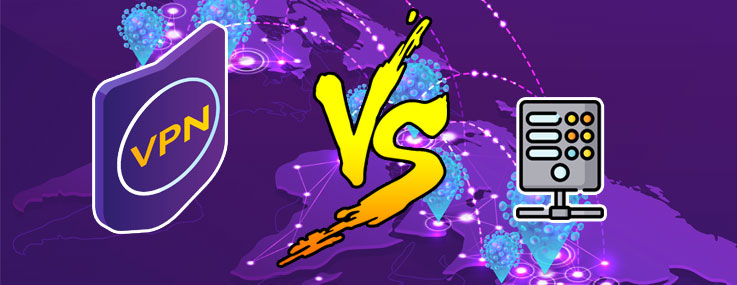Proxy vs VPN: advantages and disadvantages
What makes a person truly anonymous and leaves next to no trace on the internet? In further reading, we will discuss the advantages and disadvantages of Proxy vs VPN.
A well-known fact is that the Internet is a huge and extremely important part of our lives these days. But it is also true that surveillance became more probing than ever, as more and more things that are connected to the Web can expose more information, even exploit more, or plunder more than ever. In this light, it is very important to be able to bypass surveillance and monitoring in any way. Understanding VPN and Proxy is highly important because these are the main methods used for anonymity.
Let’s meet contestant number one: Proxy
A proxy directs your traffic via another computer instead of your own. There are private and public proxy servers, but only private proxies, usually paid can provide the type of stability and reliability that is needed.
There are, for example, SOCKS vs HTTP proxy servers.
A SOCKS server is a general-purpose proxy server that establishes a TCP connection to another server on behalf of a client and then routes all the traffic back and for the between the client and the server.
An HTTP proxy is similar and may be used for the same purpose when clients are behind a firewall and are prevented from making outgoing TCP connections to servers outside the firewall. However, unlike the SOCKS server, an HTTP proxy does not understand and cannot interpret the network traffic that passes between the client and the downstream server.
Proxy advantages
- When you use a proxy server, browsing through it allows all the benefits (Security, Speed and Geographic Location)
- Proxies are like a Web Filter. The proxy settings are applied to the internet browser whether you are using MSIE, Chrome, Firefox, etc.
- The proxy will only secure traffic via the internet browser using the proxy server settings.
Proxy disadvantages:
- Proxies are not designed to protect all the Internet traffic, usually only the browser.
- The primary proxy protocols in use today are SOCKS and HTTP. They provide no encryption.
- Many proxies pass the user’s original IP address to the destination site, which makes them unsuitable for security-conscious users.
- Some applications may not support proxies, because they must be configured separately for each application.
Let’s meet contestant number two: VPN
A Virtual Private Network is a network connection that enables a person to create a secure connection to another location, thereby you appear as if you were in another place. The computer creates an encrypted virtual tunnel to the VPN server and all of the browsings appear as if it is coming from the VPN server. In this way, the data is being kept from being exposed to eavesdroppers between the computer and the VPN server.
Unlike a PROXY, a VPN service provider encrypts all the traffic, replacing the ISP and routing all the traffic through the server, in which are included all the programs and applications. The VPN can easily be disconnected with the click of a button.
VPN advantages:
- Location spoofing is very easy – this service provider offers servers in many locations worldwide. Connections are fast.
- Fast – when this server is used a person can notice a little or no slowdowns of the internet connection.
- It is ideal for P2P filesharing.
VPN disadvantages:
First and foremost – you must choose wisely, a quality VPN that does not store data or any communication logs. Furthermore, the VPN service must implement proper load balancing so that a user may always connect to a different VPN server.
- The VPN provider can see a person’s internet activity – in many countries it is required by law to keep the records of it, and eventually, it may be handed over to the authorities or copyright lawyers.
- VPNs are vulnerable to server raids by the police, so it is vital to choose a provider who keeps no logs.
- It costs – around $10 a month.
No winners or losers
In conclusion, a proxy server is completely browser-based, so it is not compatible with certain web pages that use non-browser technology. However, a VPN will work with all internet-based services but will offer less choice on which an application will get run through your ISP.
A person needs to remember that there is no such thing as a 100% guarantee of anonymity, whichever route someone takes. There are, of course, loopholes, in any security arrangement, and individuals often give away their true identities, through patterns of behaviors, such as browsing patterns, unguarded comments made while online, etc.
Source: HowToGeek, Proxy Wiki, VPN Wiki

